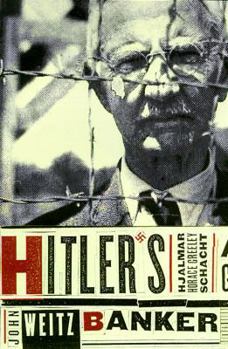Hitler's Banker: Hjalmar Horace Greeley Schacht
Select Format
Select Condition 
Book Overview
A biography of Hjalmar Schacht, Chief Architect of the Nazi economy, whose rampant inflation financed the creation of the Europe's war machine in the devastated Weimar Republic. His meteoric success... This description may be from another edition of this product.
Format:Hardcover
Language:English
ISBN:0316929166
ISBN13:9780316929165
Release Date:January 1997
Publisher:Little Brown and Company
Length:361 Pages
Weight:1.40 lbs.
Dimensions:1.2" x 6.3" x 9.5"
Age Range:13 years and up
Grade Range:Grade 8 and higher
Customer Reviews
4 ratings
Even handed
Published by Thriftbooks.com User , 17 years ago
A surprisingly even handed treatment of the controversial banker who helped ease Hitler's rise to power and then fell out of favor and landed up in a concentration camp. It's too easy to demonize everyone associated with Hitler and tougher to show how someone like Schacht could see how Hitler could help a devastated Germany after Versailles and the great inflation but not recognize his inherent evil. Those who like a world of stark black and white may not like the book because it shows humanity at a portrait in gray.
Many Shades of Weitz
Published by Thriftbooks.com User , 21 years ago
As a biographical note: John Weitz the author of this book, is the same John Weitz that was a popular US clothing desinger in the second half of the 20th century. He was also an intelligence agent for the OSS, the forerunner of the CIA during and immediately after WWII. Ian Fleming mentioned Weitz as the prototype of his character, James Bond.Weitz is also the father of Paul and Chris Weitz, the directors of "American Pie", and "About A Boy", and admirably not "American Pie II".
excellent
Published by Thriftbooks.com User , 25 years ago
This book is as my summary suggests excellent. The chapter on hyper inflation is brilliant. This book is not only a biography of Schacht which is quite gripping, but an economic history of Germany between the wars. It is simply written making it easy to read, easy to understand and detailed. It is an equally siutable book for a reader with a casual interest in this period, a GCSE student, an A-level student or degree standard.
A thorough explanation of Schacht's thinking.
Published by Thriftbooks.com User , 27 years ago
Hjalmar Horace Greeley Schacht first attracted the attention of the world when he was given credit for ending the German hyperinflation of 1923, after which the economy of the Weimar Republic performed remarkably well until the 1929 recession which eventually developed into the Great Depression plaguing the advanced capitalist system in the 1930s.When the World War I reparations payments were subject to a general moratorium in 1931, Schacht played a major role in the creation of the Bank for International Settlements that was responsible for the servicing of the loans made under the Dawes and Young Plans.to Germany. These loans were finally paid off by the Federal Republic od Germany in 1980.. Schacht had certain fundamental beliefs: he opposed the paying of reparations required by the terms of the Versailles Treaty in 1919; he had the typical banker's fear of inflation and the role of governmental expenditures in the creation of rising prices; he advocated the rearmament of Germany and sincerely believed that this would contribute to world peace. By 1936, he had begun to oppose Hitler's 4-Year Plan which, under the leadership of Goering, called for a drive towards autarky and additional military spending in an economy that was already back to full employment as a result of deficit spending.. Schacht was opposed to devaluating the mark, which was increasingly seen as a solution based on Britain's devaluation of the pound in 1931 and their comparatively successful subsequent coping with the Great Depression in Great Britain. Instead, Schacht and his cohorts came up with .the Mefo bonds which were used to deficit finance the construction of the famous Autobahns. Schacht went along with the 4-Year plan only after being assured that the Mefo bonds, which he regarded as a stop-gap measure, would be paid off or retired in 1938. Presumably the inflationary impact of rising military expenditures would be offset by the deflationary retirement of the bonds. The increasing reluctance of Schacht to go along with the Military Keynesianism of his successor, Walther Funk, who, like Schacht , was an economic journalist, showed up in Schacht's increasing criticism of Hitler and personally in his souring relationship with his first wife, Luise, who was a convinced Nazi. By the time of the serious attempt to assassinate Hitler in July 1944, Schacht was a candidate for involvement in this conspiracy and was subsequently imprisoned.by the Nazis. Thus, it becomes more understandable why Funk received a long sentence while Schacht was acquitted following the Nuremberg Trials. Schacht's opposition to the autarky and additional military spending to support Hitler's aggressive plans saved his neck , although he was harrassed by the West German courts long after his Nuremberg acquittal. Schacht never joined the Nazi Party and was clearly used by Hitler since his intellectual talents were too great to ignore. After the war his services were in high demand i





